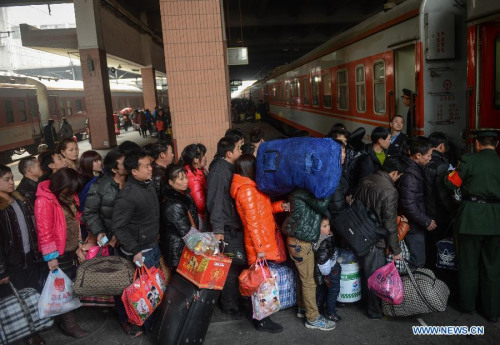
Passengers board a train from Hangzhou to Guiyang, capital of southwest China's Guizhou Province, at Hangzhou train station in Hangzhou, capital of east China's Zhejiang Province, Jan. 27, 2013. The 40-day Spring Festival travel rush began on Saturday. The Spring Festival, the most important occasion for a family reunion for the Chinese people, falls on the first day of the first month of the traditional Chinese lunar calendar, or Feb. 10 this year. (Xinhua/Han Chuanhao)
This year's chunyun, or Spring Festival travel rush, has started well before Spring Festival itself.
The peak of chunyun in the last few years has marked the most dramatic point in China's switch from an agricultural society to an industrial one.
Chunyun is often a source of stress. Many are anxious that they won't be able to get tickets.
Various online tips, which teach people how to sleep comfortably on extremely crowded trains, show ordinary people's frustration.
But while today chunyun seems like nothing but a source of frustration, in a few decades we might be looking back at it nostalgically.
Spending Spring Festival at home is a deeply rooted tradition which will continue long into the future. In comparison, the difficulties of chunyun appeared only in the last few decades, as Chinese society began to transform itself.
The bulk of chunyun travelers are the migrant workers who move from countryside to city, spending their working life in the metropolises but the Spring Festival with their families back in the village.
They typically reflect China's transformation from an agricultural society to an industrial one. It's these migrant workers who clog up the rails and roads in such vast numbers every year, as they struggle to collect their pay and head back to families they haven't seen for months.
It reminds me of Britain in the 19th century. The development of a variety of industries, such as spinning and shipbuilding, made people pour into the cities from the remote countryside.

Copyright ©1999-2011 Chinanews.com. All rights reserved.
Reproduction in whole or in part without permission is prohibited.